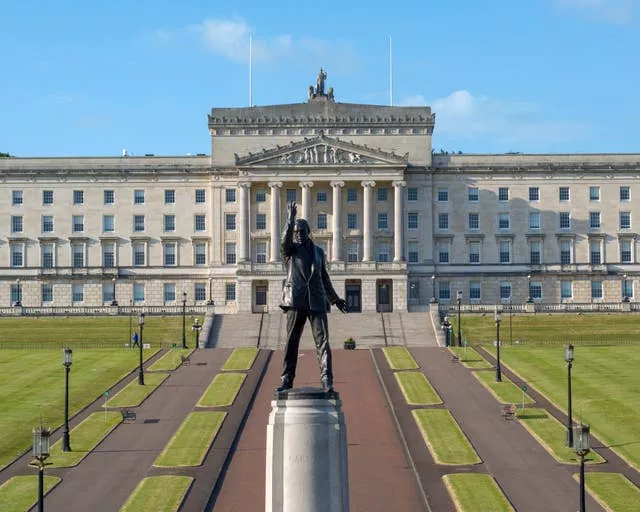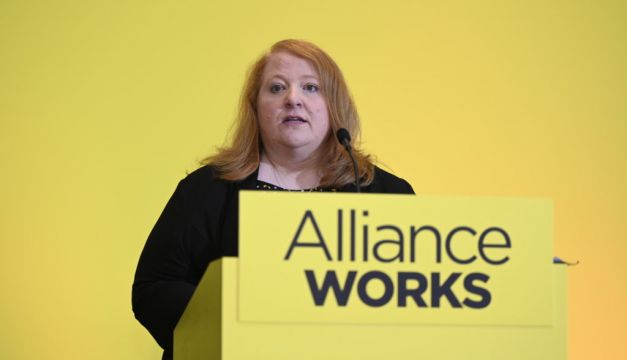Alliance leader Naomi Long has warned that her party is willing to test the legality of Stormont’s “discriminatory” voting structures.
Addressing her party conference in Belfast, Ms Long expressed frustration that the British and Irish governments had not moved to deliver reform of the powersharing institutions to release them from the unionist/nationalist “straitjacket” created by the 1998 Good Friday Agreement.
Last year, the cross-community party proposed changes to voting systems within both the Stormont Assembly chamber and at the Executive table to ensure votes cast by MLAs who consider themselves neither unionist nor nationalist are given the same weight as others.
It is understood the party has now sought legal advice on whether the existing arrangements are human rights compliant. Party officials sought the advice to establish whether a legal challenge could be mounted in the courts.
Alliance has also proposed ending the ability of any Stormont party to veto the formation of a ministerial executive.
The DUP is currently exercising its veto in protest at Brexit’s Northern Ireland Protocol – meaning the Assembly cannot conduct business and a ministerial executive cannot function.
Sinn Féin previously used its veto to collapse the executive in 2017.
The UK government has cut the pay of MLAs by 27.5 per cent amid the current impasse. Ms Long said while MLAs could not be expected to be paid in full when Stormont was collapsed, she said the Government should go further and cut the entire salary of MLAs belonging to the party blocking the restoration of the institutions.
The Alliance Party, which aligns as neither unionist nor nationalist, has been boosted by a series of successful recent elections. In last May’s Assembly poll, it emerged as the third-largest party with 17 seats – more than doubling its representation in the devolved legislature.
Ms Long told conference delegates at the Stormont Hotel that powersharing was at risk of “death by a thousand collapses”.
The North's former justice minister said it was time to implement her party’s reform proposals.
“Irrespective of whether the DUP decide that it’s in their own party-political interests to return to Stormont – for we know that’s all that matters to them – the current system of stop-go, up-down, ransom politics needs to end,” she said.
“That is in Northern Ireland’s interests and that should be the priority.

“I am weary of successive governments telling us that we have won the intellectual argument on reform – this isn’t debate club or an academic exercise. It isn’t about being right, it’s about delivering solutions.
“We do not want to be patronised and patted on the head. We want our mandate, our votes and our voters’ votes to be treated as equal to everyone else’s. We want the people who vote for us to have a stable, functioning government. No more excuses. No more delays.
“Failure to act is ruining people’s lives and jeopardising the Good Friday Agreement itself.
“By responding to those who up-end the institutions, by pandering to their demands time after time, rather than ending their ability to do so, they are condemning devolution to death by a thousand collapses.”
The 1998 Good Friday peace agreement saw the creation of a system that required the biggest political bloc of unionists to share power with the biggest bloc of nationalists in a mandatory coalition.
Currently, an administration cannot be formed unless the biggest unionist party and the biggest nationalist party agree to participate in it.
Alliance wants to change this mandatory coalition system, thus removing the ability of any big party to prevent an executive being established.
The party also wants to reform the community designation system at Stormont, which effectively hands blocs of unionists or nationalists a veto in contentious votes in both the Assembly and Executive.
The controversial method means parties, such as Alliance, that designate as neither cannot influence votes where the results are determined by how many unionists and nationalists support or reject a proposal.
Alliance insists this system is no longer fit for purpose, as an increasing number of MLAs in the Assembly are designated as “others” and are unable to have a say in contentious decisions.

It favours an alternative method whereby controversial votes require a weighted majority to pass.
“To sit in the chamber and listen to others wax lyrical about being treated like second-class citizens, when their votes count for more than ours, is frankly an affront to democracy,” Ms Long said.
“Not only is it not acceptable, it might well be unlawful, and, conference, we are willing to put that to the test if we have to.
“Because this isn’t just about us as a political party and the way in which our votes and our voters are made to count for less. It is about how ransom politics disadvantages everyone in Northern Ireland.”
Ms Long insisted it has always been envisaged that the Good Friday Agreement arrangements could be adjusted as politics developed in Northern Ireland.
“The Good Friday Agreement was always designed to be a foundation on which we could build a better, more shared and prosperous future for all our people – it was never and should never become the ceiling of our ambitions for Northern Ireland,” she said.

“Our proposals for reform enshrine the right of parties to be in government based on the strength of their electoral mandate. However, they remove the right of any one party to deny the people of Northern Ireland a government.
“They allow those who wish to get on with the work of government to do so and those who refuse to sit it out if they choose – no-one is being excluded, unlike the current absurdity where everyone is.
“And, conference, I doubt that either of the two main parties would actually walk away from government if they thought for one second that it would continue without them.”







